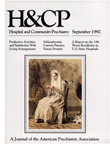Do-Not-Resuscitate Orders for Depressed Psychiatric Inpatients
Abstract
Many patients, especially those who are elderly and who have chronic medical illnesses, choose to forgo cardiopulmonary resuscitation (CPR) in case of cardiac arrest. The right of mentally competent patients to refuse CPR is supported by ethicists, the courts, and medical associations. Psychiatrists are increasingly presented with dilmmas about resuscitation preferences of elderly psychiatric inpatients whose decision-making capacity may be impaired because of mental illness such as depression. The authors discuss justifications for patients' refusing resuscitation, the role of advance directives in communicating patients' preferences, and the use of do-not-resuscitate orders for depressed psychiatric inpatients. Survival rates after CPR among elderly patients with chronic medical illnesses are low. Patients and their families need accurate information about the risks and benefits of CPR and about the consequences of refusing the procedure.
Access content
To read the fulltext, please use one of the options below to sign in or purchase access.- Personal login
- Institutional Login
- Sign in via OpenAthens
- Register for access
-
Please login/register if you wish to pair your device and check access availability.
Not a subscriber?
PsychiatryOnline subscription options offer access to the DSM-5 library, books, journals, CME, and patient resources. This all-in-one virtual library provides psychiatrists and mental health professionals with key resources for diagnosis, treatment, research, and professional development.
Need more help? PsychiatryOnline Customer Service may be reached by emailing [email protected] or by calling 800-368-5777 (in the U.S.) or 703-907-7322 (outside the U.S.).



